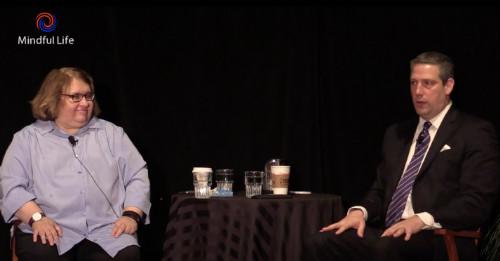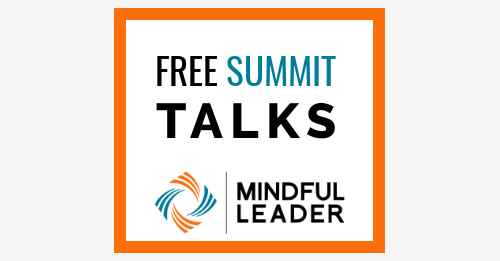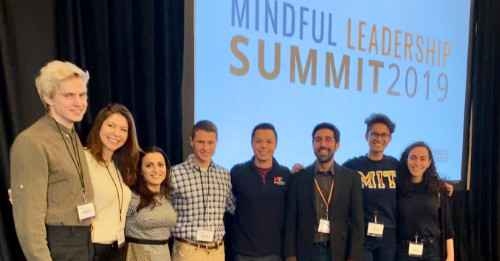Blog
3 Common Mistakes Launching Mindfulness at Work & How to Avoid Them
This Free Summit Talk has Expired

Wendy Quan and Mo Edjlali at the 2019 Mindfulness@Work Summit.
The mindfulness initiatives in organizations are met with both excitement and resistance to creating programs in the workplace. There are three ways program facilitators can overcome the three biggest challenges to implementing mindfulness at work. These approaches can include formal and informal strategies to initiate programs. To build momentum and keep an audience engaged includes introducing …
3 Habits to Turn Your Inner Critic into a Wise Advocate
By Art Kleiner, Jeffrey Schwartz, and Josie Thomson, guest contributors
Have you ever had a difficult executive decision to make? This is the kind of choice where the best options aren’t obvious, the consequences aren’t crystal-clear, and the outcome could affect hundreds of people or more. Maybe you’re a leader of a company, contemplating a round of layoffs; or an up-and-coming entrepreneur offered a lucrative deal that doesn’t seem right.
The tension you feel is between an expedient choice –…
3 Core Principles of Responsible Mindful Marketing
By Tyler McCune, guest contributor
Life is complex, communication is too
For most of human history, communication has been between small groups that share similar cultural ideals.
Yes, there were scrolls of papyrus, chiseled steles, and hieroglyphs adorning blocks of stone. But until the advent and subsequent takeover of the printing press, the vast majority of people couldn’t read, which meant that one-to-one or one-to-a-few communication was the norm.
Now we’ve created vast webs of inter…
Law & Ethics Concerning Religion in Workplace Mindfulness Programs
Professor Brown discusses why it is important for individuals to consider the legal and ethical implications of Mindfulness Programs in the workplace and in schools. First, she tackles the question, is mindfulness is a religion? And then, what is religion? Brown believes that programs in the workplace or in schools should be both opt-in and transparent about Buddhist roots. Additionally, she explains the rights of employees with regard to a report from the Equal Employment Opportunity Com…
Where Mindfulness and Compassion Make a Difference
Sharon and Tim discuss ways that integrating more mindfulness and compassion into our society could benefit us all. They look at what’s currently going on with mindfulness at the federal government level, and they share their vision for what’s possible

This summit talk has expired.
Sharon Salzberg is a central figure in the field of meditation, a world-renowned teacher and NY Times bestselling author. She has played a crucial role in bringing meditation and mindfulness practices to the West …
MIT? More Like Mindfulness in Training
By Ilona Balagula, Kalina Kourdova, Roxanne Moslehi, José Ramos, and Jeremy Scharf, guest contributors
As MBA students at MIT Sloan School of Management, the five of us are exposed to an immense array of opportunities outside the classroom. From finance groups to consulting clubs to an endless number of industry treks, how we choose to spend our time is perhaps the biggest decision we must make at school. Despite so many offerings at our fingertips, we have found that we rarely participate in p…
The Mindful Leadership Summit 2019: Challenging Assumptions
By Laura Berland, guest contributor
This year’s Sixth Annual Mindful Leadership Summit in Washington, DC brought a fresh set of voices and perspectives to honestly assess the current state of mindfulness in leadership. The rich presentations, conversations, and connections all contributed to a stellar experience of new learning, ideas, and practices. Read our main takeaways from the conference below.
Commitment from the top is necessary for organizational impacts. Or is it?
There were a number …
Debate at the 2019 Mindful Leadership Summit
Candy Gunther Brown, PhD, Rich Fernandez, PhD, David Forbes, PhD, and Barnaby Spring debate the state of mindfulness in 2019. From the rise of McMindfulness to the question of what should be allowed in schools, they covered it all in 45 minutes.
Who do you agree with? Leave your thoughts and comments below.
5 Things We Learned Hosting the Mindful Leadership Summit
How do you foster the advancement of mindfulness and compassion in the workplace? The benefits can be immeasurable, as many people learned this weekend at the sixth annual Mindful Leadership Summit. The summit kicked off in downtown Washington, DC at the Grand Hyatt with a diverse array of speakers and attendees. Hundreds of attendees came from all over the world for the experience and the chance to learn about workplace leadership and community.
The four-day summit, held November 14th-17th,…
Discover Effortless Mindfulness and Try These 5 Micro-Practices
By Loch Kelly, guest contributor
Effortless mindfulness is both a natural capacity and a skillful way to connect with ourselves and others. It is a way of being mindful from a different level of mind than we are used to. There is more to effortless mindfulness than meditation. Effortless mindfulness is primarily an off-the-meditation-cushion way of weaving together contemplation and compassionate actions. Effortless mindfulness begins by opening to a natural spacious awareness in order to beco…







